Truly an underground Metal legend, Aaron Stainthorpe emerged from dusky, rain-soaked English lands to bewitch fans of Doom Metal and epic Heavy Metal with My Dying Bride. Ranging from soft-spoken narration to the most furious of Death Metal growls, Stainthorpe now lends his vocal repertoire to a new creation. High Parasite emerged from the mind of an old friend of his, Tombs, who combined with the production prowess of Gregor MacIntosh of Paradise Lost, is about to blow the doors off of the goth and metal scenes with their Candlelight Records / Spinefarm Records full-length debut Forever We Burn.
A stunning amalgamation of danceable Pop, death-growled Goth Metal brilliance, and even a touch of Industrial, High Parasite is sure to leave an impression. The poetic, brilliant vocalist recently sat down to discuss his involvement in the band, the sanctity of writing, and the bright future that lies ahead for these purveyors of upbeat gloom.
Cryptic Rock – Having one of the most incredible, emotive voices in Heavy Metal, your work in My Dying Bride is beloved and well-known. Whether it is the soothing clean tones you employ, or the ravaging death growl, you not only have the vocal chops, but the words you express in your lyrics are almost unrivaled in terms of their poetic power and their ability to move the listener. Now we find you entering into this new adventure called High Parasite.
Aaron Stainthorpe – I appreciate it. That’s very kind of you to say. It’s just stuff that I do. I don’t throw words together in two minutes. It takes a long time to get right. I never rewrite though. I don’t go back and think, “Hmm,” because I know that at the point where the pen meets the paper, that’s where the emotion is. And if three days later, you wonder why you felt that way three days previously, it doesn’t matter. That’s how you felt, and the words stay. There’s a lot of buzz about the band (High Parasite) at the moment. I’m really enjoying it.
Cryptic Rock – There is no substitute for that type of creation. Referencing that three-decade career that you have with this well-established band, what exactly was the impetus for this new venture with High Parasite? How did you come to know Tombs and the rest of the guys?
Aaron Stainthorpe – Well, I’ve known him for about 20 years. I’ve been to a couple of great Halloween parties he has thrown, so I socialized with him for a number of years and worked with him. He was part of My Dying Bride’s crew for a while, and I know he works with Greg (Gregor Mackintosh) from Paradise Lost. So he’s been in the music business for quite some time.
And it was only one day, it was three years ago now, he sent me an email with a piece of music he’d written on his laptop, and he played all the instruments. And he just said, “Look, Aaron, I can do the clean vocals, but I can’t do the death metal vocals. Can you help me out?” So I said, “Yeah, of course I can.” The music sounded great, so I did the death metal vocals on it. Then some more songs came along, and I helped him out with those.
Then he said he was going to try and put an actual band together with real members, and I said, “Well, good luck with that.” And he went away, and he came back later saying, “Aaron, I found some people. We’re going to go to Manchester and record a demo. Can you make it?” “Yeah, I can make it. Manchester’s only an hour away.” So I went along and recorded the demo, and then some record labels showed a lot of interest. In fact, quite a lot of record labels showed a lot of interest, which was amazing. And I still wasn’t entirely sure where it was going or what my involvement was.
And when we were recording, the album discussion came up about, “Aaron, are you in the band? Are you not in the band?” And I just kind of looked around and I thought, “I think I’m in the band, right?” And everyone kind of nodded. So it wasn’t a case of “Aaron, will you join High Parasite?” And it wasn’t a case of me saying, “Guys, can I join? I really want to join.” I just evolved into one of the vocalists, and it seemed very natural, and it’s worked really well with Tombs, and so far, so good. I mean, we’ve already begun work on the second album. The first one’s not out yet, but that’s just me overtalking things.
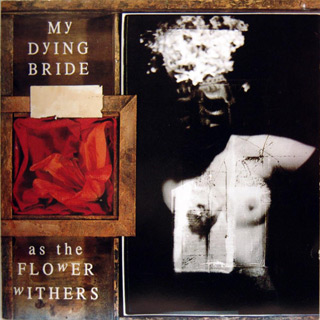
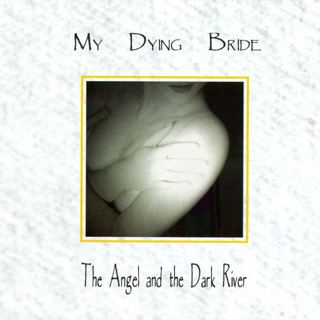
Cryptic Rock – That is awesome news. The material on Forever We Burn is at once strikingly catchy, brutal, and serene. It strides the lines between genres, Goth Rock, Pop, and Metal. So that songwriting process was already completed, or you came in and put the vocals over it, and I’m sure certain changes were made from you doing that, or how did that work?
Aaron Stainthorpe – Tombs wrote all the music and then just again sent the email to the rest of the guys saying, “Can you learn this?” And he went through it step by step with the music and notes, etc. And then when we went to the studio, it was all pretty much done. I know when Greg came in, Greg made a couple of changes with certain things and did some guitar and some samples, which was great. And his wife, Heather, sang on the album as well.
But for the most part, the songs were already complete when we hit the studio. And Tombs wrote everything, as far as I’m aware. He’s written some of the lyrics, I’ve written the majority. And yeah, I mean, he’s a perfect songwriter. As I say, he’s already got 11 songs for album number two, because he never stops. Sometimes you might stop and go to sleep or eat some food. He generally doesn’t even bother with that. (laughs) He’s one of those people who just loves to create music, and he’s not going to play on the Xbox. It is all about music for him.
Cryptic Rock – Upon listening to the album, all the elements and your voice blend so seamlessly together, that it sounds like all of you created the music from the ground up together. Your vocal contribution has a lot of your signature style in it, sounding so comfortable and natural inside this music that it feels like he wrote it for you or you wrote it together. That chemistry feels very natural. You cannot force something like that. Would you say it’s harder to work within those short, brief, quick songs than it is for you to work on the much longer, slower, dirge-like material of My Dying Bride?
Aaron Stainthorpe – No, it’s much easier. It is much easier to do shorter songs. I can’t imagine why someone would say it’s harder to do a short song than it is a long song. For me, it’s definitely easier, particularly when… Sometimes Tombs even writes some of the vocal lines for himself and me. So I’ll get an email with a piece of music, and he’s already sung all the way over it from start to finish and written all the lyrics, but he does his impression of a death metal vocal and just says, “Aaron, this is just a guide. This is where I want you to sing. Go for it.” And then I’ll sing, just erase his voice, and put mine on.
And other times, the song comes with nothing at all, just music. And he says, “Knock yourself out, do anything. Clean vocals, whispering, screaming, narration, just do what you want.” And I’m let loose to do whatever I want. And there are times when I’ve written clean vocals for him, but he’s liked what I’ve done and said, “Well, you might as well sing it here.” So it kind of works both ways, and we get on so well, and the writing is so natural and flexible. And no point do we argue about, “Oh, I want to sing this. Oh, I want to sing that.” It doesn’t work like that. We write down our ideas, and they just work, and we just nod and say, “Yes, that works, and it’s a great atmosphere.”
Cryptic Rock – Forever We Burn seems destined to be one of the best albums released this year, if not tops on many lists. How does this make you feel?
Aaron Stainthorpe – Thank you very much. I hope so. I mean, we’ve worked hard on it. There might be short, funky, punchy songs. We’re not reinventing the wheel here, we’re just trying to write great goth rock songs everyone can sing and dance to. We all like singing to a great chorus, a great hook, and that’s just what we’ve done. And we just hope that people will latch onto it, love it, and help us make the band bigger.
Cryptic Rock – I think most people want the wheel and not the reinvention of it. Fans and critics sometimes get caught up in comparisons and lament that new music sounds like other music that came before Right, and because you loved that music, you’ll love this music. That’s why it works. You and many of your peers came out of the ’90s Death Metal scene, be it My Dying Bride, Primordial, Samael, Moonspell, or Paradise Lost, and then you began seeing this Gothic-infused, smoother vocal sound becoming popular. It wasn’t always met with the best critical acclaim or fan reaction. Virtually all of you returned to the roots a bit after this departure. Since that time, have you always, in the back of your mind, wished to return to that style; incidentally, the style we are witnessing in High Parasite?
Aaron Stainthorpe – No. Well, to be honest. I mean, if that first song from Tombs arrived three years ago, then that was obviously while MDB was still writing A Mortal Binding, I guess, and probably still touring and singing the older songs, and that’s all I wanted to do. I did some guest appearances on other people’s albums, and that’s fine because it’s not your own thing. You do it at home, it’s dead easy. And at no point did I think to myself, “Oh, I really want to be in another band.” It just never cropped up because I was content being in My Dying Bride.
And it was only when I started working with Tombs, I thought, “Yeah, this is going places. I want to be part of this.” And I sort of had this internal monologue where I’m thinking, “Can I be in two bands? How am I going to juggle that?” And then you look, well, sometimes there’s three or four years between My Dying Bride albums, and My Dying Bride only plays 10 or 15 shows a year, so I can be in five more bands. There’s loads of room for me to create things in and around My Dying Bride.
So when we were doing the album, the High Parasite album, I thought to myself, “Yeah, I can manage this. It’s not going to spiral out of control. There’s easily room for two bands, so this is what I’m going to do.” And I never thought I was going to be in another band. I was never harking back to a time when… I mean, I was in the Depeche Mode fan club before My Dying Bride, so I always liked that kind of dark electronic thing. So when Greg did what he did on the High Parasite album, of course, I loved it because he’s from a similar age as well. He loves that kind of stuff.
But I never imagined being in another band. It crept up and surprised me a little bit, but I thought I could squeeze this into my life, and so far, it’s been absolutely brilliant. And in fact, it’s encouraged me to do more poetry. I’ve now got a poetry reading in a cathedral in Belgium on the 25th of January with some added musicians, Mark Deeks from Arð, Joe Quail was going to play the cello, and we’ve got a choir. So that’s going to be something awesome. And I think if that takes off, then we might try and take that on tour as well. So that’s another thing that I’m playing with.
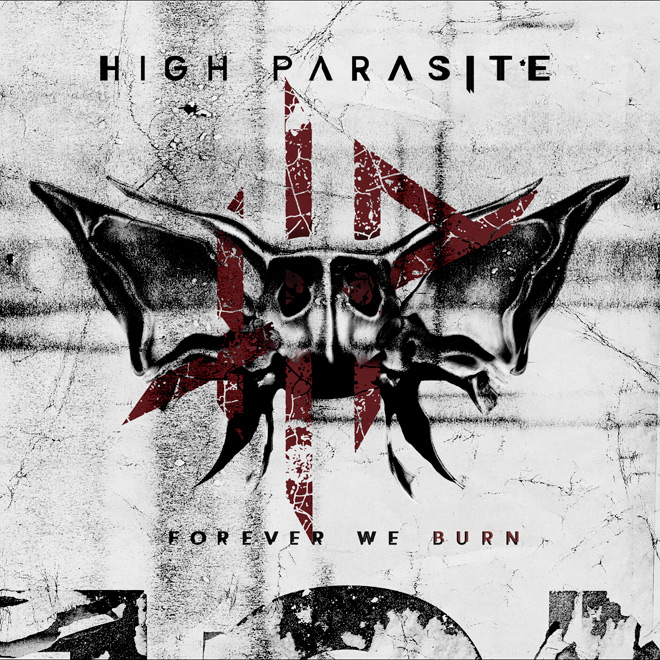
So I’m trying to keep myself busy, but it’s not like I’ve got an agenda. I just sort of think, “I’ve got time to do stuff, I’m going to do stuff, otherwise I’m going to sit around twiddling my thumbs and I’ll waste my time.” And I want to fill my time with creativity, so that’s what I’m doing.
Cryptic Rock – Brilliant, to be able to manifest all these creative outlets. Speaking of creativity, your lyrics have always been outstanding. In fact, many would put you in the top three to five lyric writers in Metal of all time, without reservation.
Aaron Stainthorpe: Well, appreciate that. Thank you very much.
Cryptic Rock – The lyrical slant and overall messaging on Forever We Burn, the theme seems to say that we are all staunchly marching to oblivion. The flame is burning, but we are dancing onto our collective end. All are destined to fail, so live in the moment. Have we become too cynical as a people, or is this the only path left for reasonable people?
Aaron Stainthorpe – When we write this stuff, like My Dying Bride, it’s not old-fashioned, but it’s in a world where we take contemporary issues and ignore them so that when you indulge in My Dying Bride, you forget about the rat race and the turmoil that we’re living through. It’s escapism, and that’s what My Dying Bride should always be. High Parasite is similar, but we’re not being political, we’re not preaching, but we do touch upon certain areas that we’re all aware of. The world is in a shitstorm, but we don’t dwell on it and we don’t ram home our policies. We touch upon ways that maybe you can improve yourself, your well-being, and your mental health.
“My Syndrome” is a song about someone going crazy. And it’s one of those things where sometimes you don’t know if you can always cope with life whenever you walk out of the house. Well, not everybody can. And for me, what I try to tell people, and this works for me, but it won’t necessarily work for everybody, these insane thoughts that why your brain comes up with them, we do not know. Some chemical imbalance maybe, but you come up with these wildly negative thoughts sometimes, and if you allow them to build in your head, you will go down that rabbit hole, and it’s going to spiral out of control.
So for me, I write or I create artwork, and in that process, you can feel like little valves being lucid and steam coming out of your ears, and you realize the creative side of things. The writing is allowing me to exorcize my demons and put them somewhere else. And after a good solid writing session, be it poetry or lyrics, for me, they’re very much the same thing. I do feel not tense, but I have more clarity in my brain, and it’s therapeutic for me, and it makes me feel good.
I always encourage other people when they’re feeling the strain, to try and do something creative. It doesn’t have to be brilliant, and you don’t have to show it to people. It doesn’t have to be in a gallery to be critiqued by those in the know. Just do it as a way of helping your own mental well-being, because it’s good to get that stuff out of your head and stick it anywhere creative. My poems stayed in various drawers and cupboards for years and years, and it was only earlier this year when someone decided to help me publish a book of my poems. And I fished for them all, and I dug them all out. And some of them, they’re all old pieces of paper that I’ve not seen for 25 years, and I’ve already digitized them. I’ve typed them all down, which was good. It was so monotonous.
It is just the technical thing of taking a scrap of handwritten paper and typing it into the keyboard. Of course, these processes today, are not used in poetry. I quite like to make up words, and sometimes they’re not grammatically correct poems because it’s not a sentences as such. So every single thing I type is underlined in red or green, and the computer is trying to auto-correct, and I’m thinking, “Oh God, just stop.”
That’s what it is, but for me, when my head is getting in a confused state and I need clarity, I put pen to paper, and I write and I write and I write, and I don’t know if it’s going to be lyrics. I don’t know if it’s going to be a poem. I don’t know if it’s just random thoughts, just to help me get by for the next 12 hours, or something like that, but it really does work.
Cryptic Rock – We need those built-in escapes, especially as things get crazier. And it’s interesting to hear your semi-humorous clash with technology because we all have that. Now, every single thing you try to do on your mobile phone, there’s this little AI bot that’s trying to help you do it better. Nothing beats pen to paper, with nothing trying to silo you into a thought pattern or help you think.
Aaron Stainthorpe – Yeah, there’s a coffee stain on it, you’ve crossed things out, there are spelling mistakes, because when I write, I write quite quickly because my brain, it’s chuntering away at 100 miles an hour, so I’m trying to write it down. So my writing is erupting, at best, and it’s filled with spelling mistakes. But it doesn’t match it to me because, as I said, no one was going to see it, so it didn’t make any difference if it was filled with spelling mistakes. Obviously, when the book comes out, that will be corrected on my behalf by an editor or a computer, but for me, it doesn’t matter if there are mistakes or you just got to get it. It’s an exercise in mental stability, and I think it’s definitely worthwhile doing. And who cares if it looks like shit.
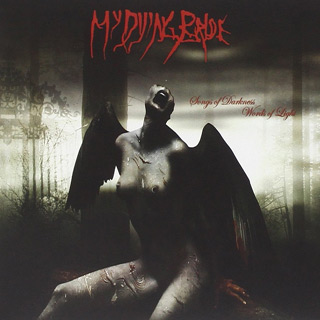
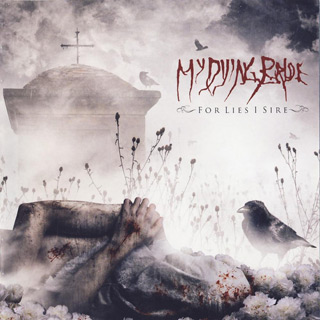
Cryptic Rock – Hail to analog men in a digital world. As the musical landscape changes, as career musicians, make music that is generally underground, do you find that anything has changed in terms of trying to make an impact amid all the saturation? A lot of people can create music. There’s an instant gratification feeling in society that sometimes the music we love does not cater to. Do you think fans of dark and heavy art will always be a bastion of support for real, bona fide, non-AI art? Do you think there will always be a place in the underground for people like us?
Aaron Stainthorpe: Yeah, I definitely think so. I don’t know, this might be the wrong thing to say, but the more commercial something is, the less heartfelt it seems to be. But then I look at High Parasite and I think, “Well, we’re trying to write the catchiest things ever.” We want the music to be played on radios all over the world for people to enjoy. And if that ends up making the band huge, then yeah, great. But it doesn’t mean we don’t write these songs in two seconds flat, I’ve got to remember that for every single word I write, people are going to read all over the world, and they’re only going to compare it to the things I’ve written previously. And if it’s not up to scratch, then I think I might start to begin to look a little bit foolish.
But I do have to ensure that My Dying Bride and High Parasite are completely different because, with My Dying Bride, I really go for it. It’s 100% deep, dark, felt poetry. High Parasite, because of the nature of this effervescent, high adrenaline music, you can’t get too heavy with the words. The songs are too short to be able to tell a proper story like you can with My Dying Bride. So I write in a slightly different style, but it’s still me. I still want people to read what I’ve written and sort of nod a little bit and go, respect to that, rather than just write, “Yeah, yeah, yeah. Come on, baby.”
But yeah, I think there are still people out there, some of the bigger artists who are still trying to keep it real, for want of a better statement. But people just see the millions of streams and the millions of dollars and just think, “Oh yeah, they’ve sold out”. And I don’t necessarily think that’s true. I think some people are still really into it because, I mean, even the super groups, don’t need the money anymore. So why are they still touring? Because they absolutely love it. And if you love it, then that can’t be a bad thing.
Cryptic Rock – The love of the art is always what moves people the most. Regarding our world of underground Metal, there is a different sense with bands from the UK and Ireland, yourselves, Anathema, Primordial, and a few others. The lyrical references to God, permeate here and there in the lyrics, but you are not tipping your hand in any way. You were raised in a far more Christian society than, for example, our brothers up in northern Europe. There is almost this background conversation to God as the imperious, invisible Father that watches cold and distant. Such a lyric pops up on “Grave Intentions” with the reference to the subject’s face covered ‘like the veil of Christ.’ Can you expand on this relationship?
Aaron Stainthorpe – Well, my father was a Yorkshireman who joined the Army when he was 17, and although I was born in England, I spent 15 years in what was then West Germany moving around with the military. And my mother is Irish and a good staunch Catholic, neither with us anymore, unfortunately. My mother wanted us to go to church, but my father was having none of it. And so I think they had a conversation at some point, and it was a case of, “Well, you can if you want to. And if you want to go with Mum, it’ll be great.” I’m half Irish, and I have a large family in Ireland, some of which are religious people, and some of them are just like, “We can take it or leave it.” But the English side pretty much decided, “Thanks, but we’ll leave that.”
And there was a great story when my grandmother in Ireland used to carry her money around in a small plastic bag with holy water in it, so everybody knew her. And so when she went shopping, she paid for everything with soaking wet money. But everybody in the shops knew her anyway, and they knew that “Okay, this is holy water,” and that was a funny thing. And once or twice, she actually flew from Ireland to Germany to spend Christmas with us. And it was those occasions when we did go to Midnight Mass on Christmas Eve, but that didn’t feel like a religious event. It felt like Christmas, like a festive event.
And so I think she was trying to gently get us into the swing of Christianity through the back door, if you like, of gifts, presents, and all that sort of stuff. But it was lovely at the time, but it never really… You only have to look at history and how many wars. More people have probably died through religion than anything else. They say that mosquitoes are supposed to be the biggest killer of the human race. Well, I think perhaps it might be religion, but who knows?
So I looked at it when I was younger, it wasn’t for me. And you hear endless stories of priests fiddling with children, and the Pope hiding everything like that. It’s not even a secret anymore. The Pope acknowledged, “Yes, it happens, and we do our best to tell them to stop it.” And it’s like, “Really? Do you really do your best? No, you don’t.” And so you realize what a hateful thing it really is, but the Bible is a great rich source of storytelling.
And it is funny. There are different Christian groups throughout the world who pick and choose which bits of the Bible they prefer, and there are bits they don’t talk about. And then there’s other people who like that bit, but not the bit you like. And they’re all arguing amongst themselves, and it’s like, “Oh, for God’s sake.” The amount of smiting that God does in the Bible, and the amount of death and mayhem, it’s almost terrific.
Recently, just for some sort of relaxing techniques, I’ve been attending a Buddhist center not far from where I live, not for the religious thing. They just teach you about breathing and how to not get panicky, keep your heart at a nice sensible pace, and you get free tea and cake. So that’s great. And the last thing the guy spoke to us about, he just said, “You know what,” because they believe in reincarnation, and this is a wild statement, “Every living creature, at some point, has been your mother.” And I’m thinking, “Okay, that’s not quite right.” And he said, “And if only everyone could think like that, there’d be no more war. Why would you start a war with your own mother?” And broadly speaking, they’re just saying, “Can you stop fighting everybody?”
The Bible could have been this thin with the opening gambit saying, “Be nice.” And that’s all we have to do in life, just be nice. The Bible’s full of fire and brimstone, and it’s like, “That’s not nice at all. Stop being like that.” I’m not going to be a Buddhist. I’m not converting to Buddhism. I go along because they’re lovely people, and it helps me sleep. I’m not a great flyer. I don’t really like flying. And some of the breathing techniques they teach you, when you’ve got turbulence, you’re flying across the Atlantic and everyone’s a bit panicky, I just get into my breathing mode, and it really, really helps cool the situation down. So I’m in that for my breathing.
You’re not going to find any lyrics about Buddhism coming up because I’m not in it for that. And they’re never trying to sell it to me like that. It’s not what they do. But yeah, the Bible’s great for fishing for great stories. Everybody’s been at it for years. And long may it continue.
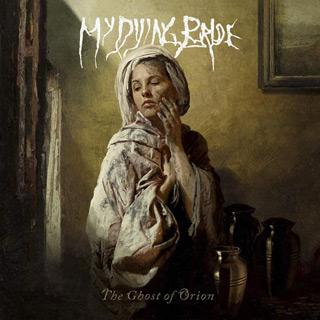
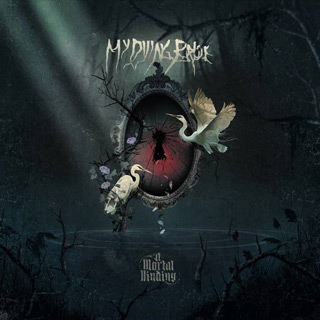
Cryptic Rock – Fascinating to hear of your past, and its influence on you. The album Forever We Burn does run the gambit of genres. From the most poppy one, the half-eponymous track “Parasite.” That one, I could see being radio fodder. And then you could play “Concentric Nightmares” and everybody’s in a mosh pit. I mean, that part is so heavy. And your death metal voice, you sound as mean on that as you did on “God Is Alone” in My Dying Bride from way back in 1993. That song sounds every bit as violent as it did when you made it.
Aaron Stainthorpe – I have not heard that for a long, long time. I might put it on after this.
Cryptic Rock – You have an amazing ability to do the clean and harsh vocal, something many bands do but few do well. In the music of High Parasite, you’re able to make that transition seem like troughs, crests, and waves instead of, “Now this, now this, now that.” So I think that’s difficult to do.
Aaron Stainthorpe: I need to keep that variety because I can’t play an instrument, so I need my voice to be my instrument, which is why I’ll go from whispering narration, clean vocals, death metal vocals, right up to the black metal screeching that you hear on the last song on the album. Because, at that point, I was in a studio, and I just absolutely went for it, full of screaming. And then we added an effect, which made it sound like an old black metal tape from the 1980s. Because those were my formative years. And it’s great to be able to do something now in 2024 that almost mimics or pays tribute to the stuff I was listening to 35, or 40 years ago. And again, it just adds variety to the vocal style because I can’t play an instrument. I have to have a variety of other things, including my voice, to be able to keep it interesting for not just the fans, but for me as well.
Cryptic Rock – You captured the same feeling emoted on “She Is The Dark” (2002’s A Light At The End Of The World). This is not My Dying Bride at all, but just in terms of what you bring to the table here. Hopefully, you can bring High Parasite to the States and beyond to tour.
Aaron Stainthorpe: I hope so. We are going to try and take it everywhere. I might be thinking ahead here, but with our strong connections with Paradise Lost, they’re always in the States. If we can hang along with those guys, it would be absolutely brilliant.
Cryptic Rock – It is quite remarkable that many years later, your death vocals sound just as monstrous. That must be difficult to maintain.
Aaron Stainthorpe – Yes, and while I’m still able to do it, I’m going to do it, and while that music requires it. There were some people mentioning something about a couple of My Dying Bride albums, asking why aren’t there more Death Metal vocals. If the riffs are slow, meaningful, and layered with beauty, I’m not going to do death metal over them all because it won’t work. If the riffs punch you violently, it gets a death metal vocal. I try to keep that balance because that juxtaposition can sometimes grate. You’re enjoying lovely, peaceful music, there’s a lovely bit of violin and all of a sudden… It doesn’t work. And that’s what I did in the early days because that’s all I knew what to do. As I grew older, I realized I should try and make the voice fit the music a little bit better. And so that’s what I’m trying to do. And hopefully, with High Parasite, it’ll be a similar thing because the music ramps up, and so does the vocal.
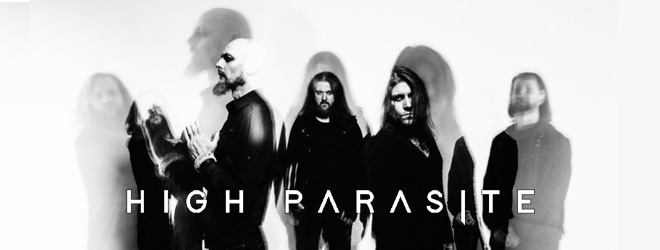
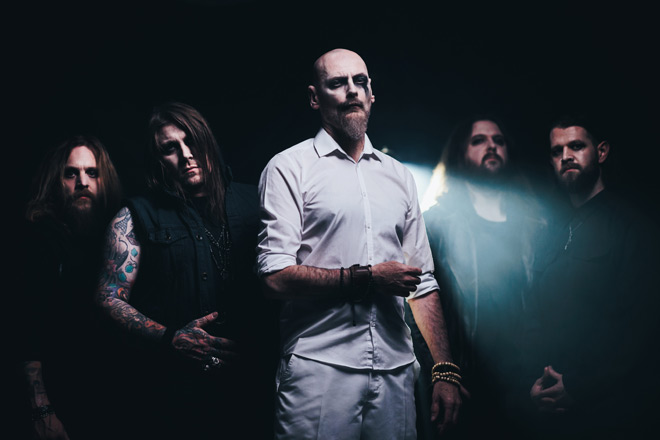
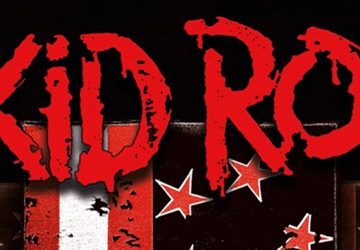
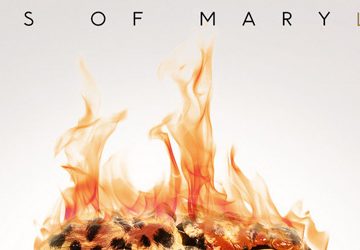


No comment